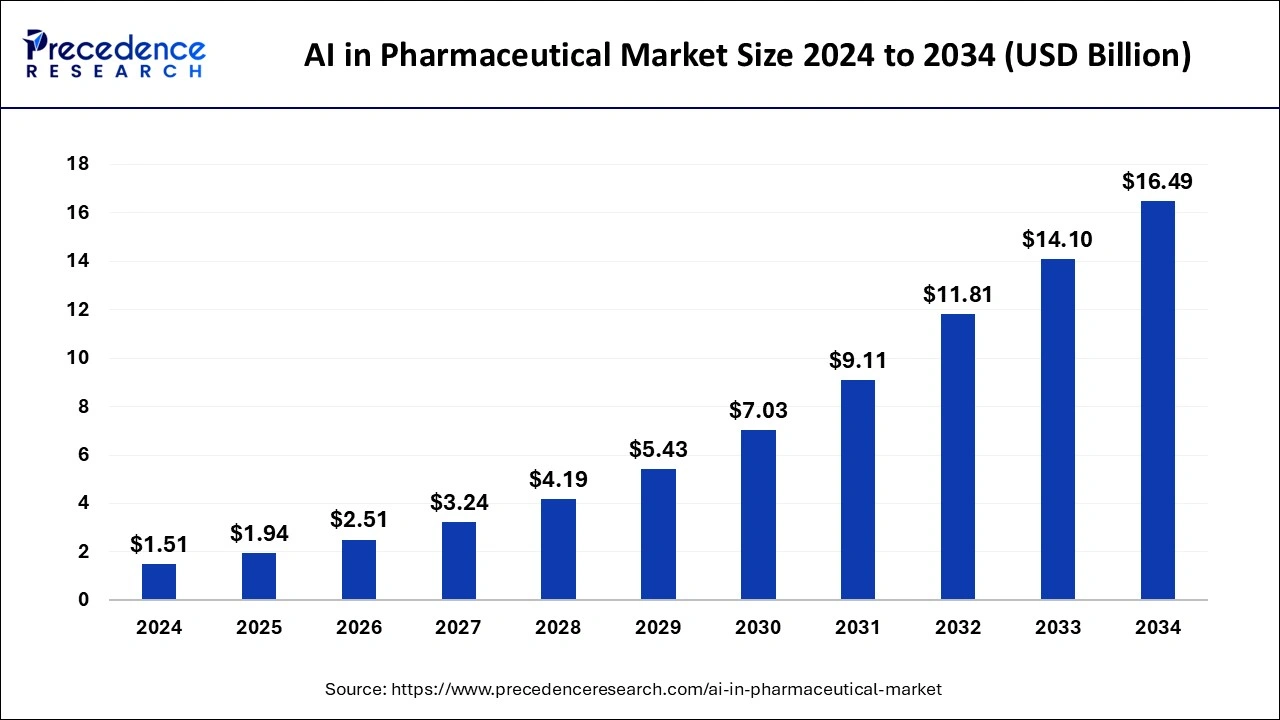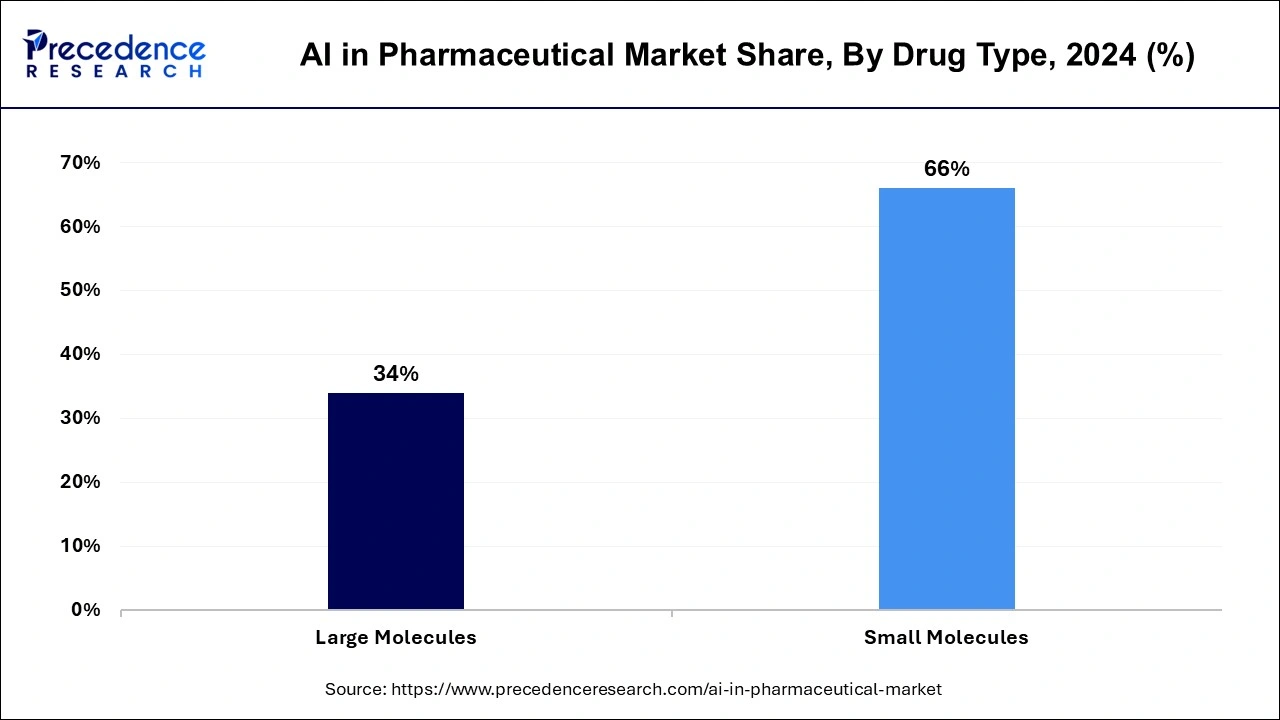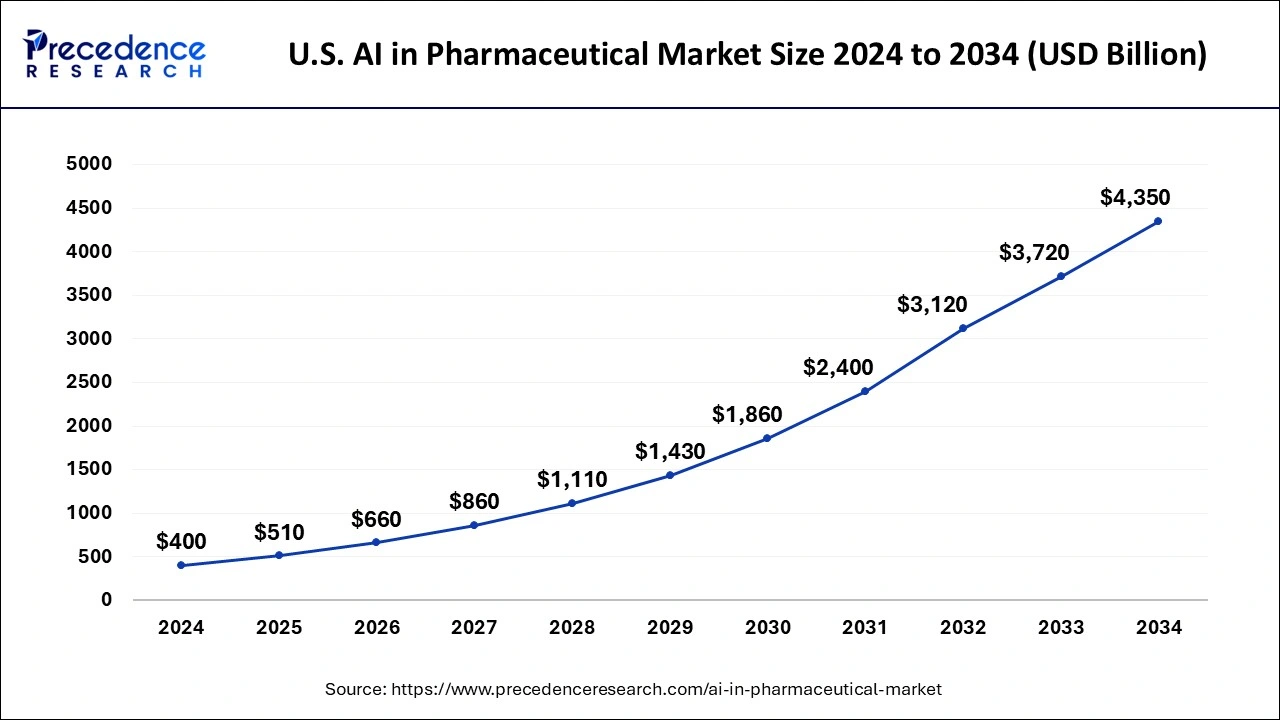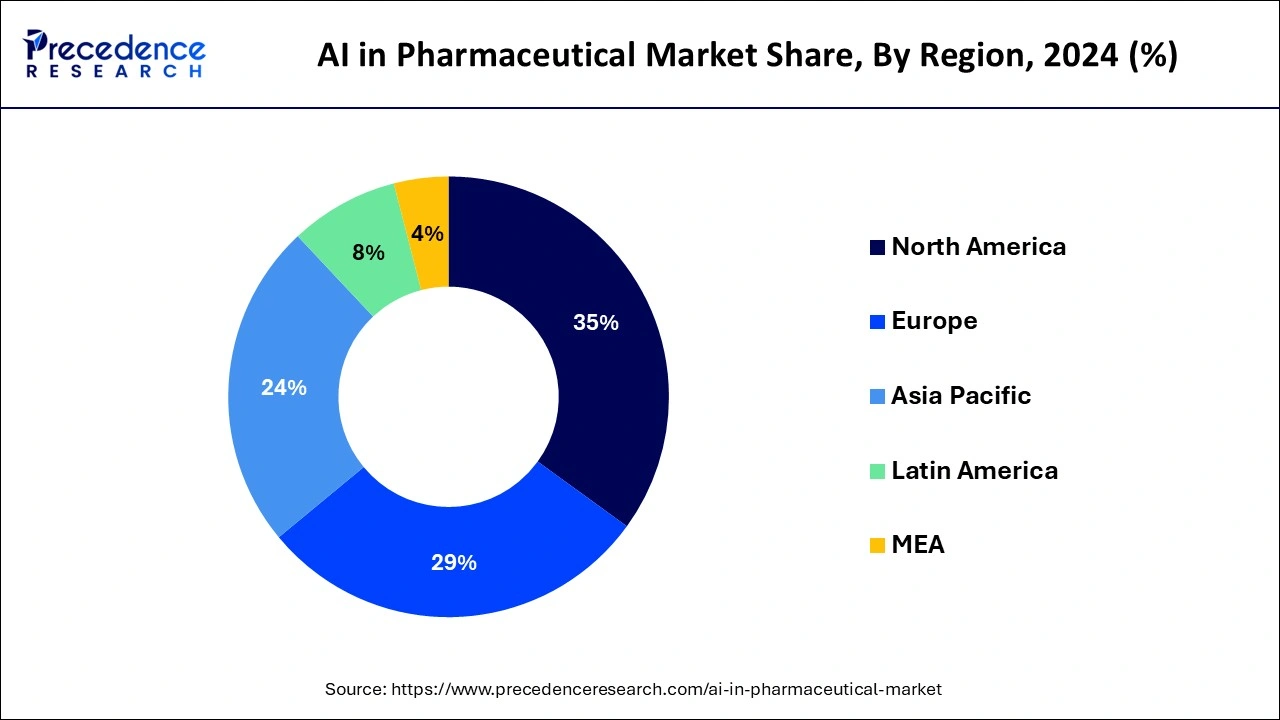What is the AI in Pharmaceutical Market Size?
The global AI in pharmaceutical market size is valued at USD 1.94 billion in 2025 and is predicted to increase from USD 2.51 billion in 2026 to approximately USD 16.49 billion by 2034, expanding at a CAGR of 27% from 2025 to 2034. The increasing demand for innovative and effective drugs, rising focus on regulatory compliance and safety, rising prevalence of chronic diseases, and rising use of AI in drug discovery & development are expected to drive the growth of the AI in pharmaceutical market during the forecast period.

AI in Pharmaceutical Market Key Takeaways
- North America dominated the global AI in pharmaceutical market with the largest market share of 35% in 2024.
- Asia Pacific is projected to grow at the fastest CAGR during the forecast period.
- By drug type, the small molecules segment contributed the highest market share of 66% in 2024.
- By drug type, the large molecules segment is projected to grow at a solid during the forecast period.
- By technology, the deep learning segment accounted for the highest market share in 2024.
Market Overview
Artificial intelligence (AI) has come a long way in the pharmaceutical industry, playing significant roles in various aspects. AI technologies offer numerous advantages in the pharmaceutical industry including accelerating the development of new drugs, optimizing clinical trials, improving production processes, and personalizing treatments. Leveraging AI assists in improving supply chain management by predicting demand and monitoring product quality. By harnessing the power of AI, pharmaceutical companies can rapidly advance the future of healthcare. The AI can significantly enhance the operations related to manufacturing, clinical trials, and research & development.
AI in Pharmaceutical Market Growth Factors
- The rising adoption of Artificial Intelligence (AI) for clinical trials is anticipated to drive the growth of the market during the forecast period. AI can optimize clinical trials by identifying suitable patients and predicting any potential adverse reactions.
- The rising healthcare expenditure, favorable government policies, and strong economic growth are some of the major factors propelling the expansion of the AI in pharmaceutical market in the coming years.
- The top companies in the pharmaceutical industry are collaborating or partnering with the players in the AI industry to implement AI technology in drug discovery, research and development, and drug manufacturing, contributing to the overall growth of the market.
- Pharmaceutical companies are adopting AI to improve the efficiency and effectiveness of their operations. Some of the key trends in AI adoption include process automation, predictive analytics, AI platforms, and virtual clinical trials.
- The rising use of Robots and automated systems powered by AI algorithms to manage and optimize production, distribution, and logistics processes. These systems also assist in predicting equipment failures, improving inventory management, and optimizing the supply chain.
Market Outlook
- Industry Growth Overview: The rising healthcare expenditure, favourable government policies, and strong economic growth are some of the major factors propelling the expansion of AI in the pharmaceutical market in the coming years.
- Global Expansion: The AI in the pharmaceutical market is witnessing rapid global expansion, driven by significant growth in North America, Europe, and Asia-Pacific.
- Major investors: Major investors in the market include Pfizer, Novartis, AstraZeneca, and Johnson & Johnson.
- Startup Ecosystem: The market startup ecosystem is rapidly transforming drug discovery, development, and production by accelerating timelines, minimizing costs, and improving success rates through advanced algorithms and data analysis.
Market Scope
| Report Coverage | Details |
| Market Size in 2025 | USD 1.94 Billion |
| Market Size in 2026 | USD 2.51 Billion |
| Market Size by 2034 | USD 16.49 Billion |
| Growth Rate from 2025 to 2034 | 27% |
| Largest Market | North America |
| Base Year | 2024 |
| Forecast Period | 2025 to 2034 |
| Regions Covered | North America, Europe, Asia-Pacific, Latin America, and the Middle East & Africa |
Market Dynamics
Driver
Rising drug discovery and development process
The increasing use of AI reduces the time and cost of drug discovery & development are expected to drive the growth of the AI in pharmaceutical market. Artificial Intelligence (AI) has the most critical application in drug discovery and development. Earlier, the discovery of new drugs was costly and a time-consuming process. AI integration has transformed this process by speeding up the identification of potential drug candidates. The usage of AI algorithms predicts how different molecules interact with biological targets, assisting in identifying which compounds have the highest or lowest potential for therapeutic benefit. Machine learning algorithms enable researchers to analyze vast amounts of biological, chemical, and clinical data to identify new therapeutic targets and predict the efficacy of new molecules. By leveraging AI tools, pharmaceutical companies are increasingly working on minimizing and preventing human errors, reducing R&D costs, and accelerating the research timeline, which leads to effective and cost-effective drugs. Therefore, the use of AI can reduce the cost and time of drug development and improve accuracy in predicting successful drug compounds.
Restraint
Lack of Healthcare IT Infrastructure
The lack of healthcare IT Infrastructure is anticipated to projected to hamper the market's growth. The deployment of AI tools and technologies requires expensive infrastructure investment to broaden coverage and operate. Several lower and middle-income countries lack healthcare IT Infrastructure, which is likely to limit the expansion of the global AI in the pharmaceutical market.
Opportunity
Rising demand for personalized medicine
The growing demand for personalized medicine is projected to offer lucrative growth opportunities to the market players in the coming years. AI holds great potential for personalized medicine, to improve the treatment of various chronic diseases. Leveraging AI algorithms assists in using genomic data and past medical histories to identify patterns and make appropriate predictions to personalize patient treatments which often results in becoming more effective therapies with lessening side effects. For instance, the usage of AI can aid in determining the exact dosage of drugs based on the patient's unique genetic makeup, thus raising the treatment efficacy and minimizing risks.
- In October 2024, BioNTech and its AI subsidiary InstaDeep unveiled their AI strategy at an event called "AI Day." The companies plan to use new models and supercomputers to accelerate the development of vaccines and cancer therapies. With InstaDeep as its in-house AI specialist, BioNTech aims to advance the use of AI in developing personalized vaccines and targeted treatments. A key focus is the DeepChain platform, which uses various omics data for drug design.
Technology Insights
The deep learning segment accounted for the highest market share in 2024. Deep learning can efficiently identify the certain health conditions that develop in the body and can predict regarding the health conditions accurately. Deep learning technology covers the procedures such as cardiovascular diseases, sepsis, and thyroidectomy, which has significantly fostered the growth of this segment. The increased usage of the deep learning technology in the diagnosis and prediction of the health conditions has led to the dominance of this segment.
The querying method is estimated to be the most opportunistic segment during the forecast period. This is attributed to the increasing popularity of the query method as a communication tool. It is being increasingly used as an assistant in digital applications.
Drug Type Insights
Thesmall molecules segment contributed the highest market share of 66% in 2024.This is attributed to the huge demand for the small molecule drugs across the globe. The small molecule drugs are the most common types of drugs like aspirin and diphenhydramine, which is extensively used for the prevention and treatment of a disease. Therefore, the huge demand for the small molecule drugs have resulted in the increased usage of AI in the production of the small molecule drugs. Moreover, the US FDA had approved around 59 drugs in 2018, 71 of which were small molecule drugs.

The large molecules segment is projected to grow at a solid during the forecast period. The rapidly growing demand for the biologics owing to the increased investments in the development of the biologics industry is fueling the demand for the large molecule drugs. Moreover, the development of biologic drugs for chronic diseases like cancer is expected to drive the demand for the large molecule drugs, thereby driving the growth in the use of AI in the production of the large molecule drugs.
Application Insights
The drug discovery segment is diminated the market in 2024. AI is now increasingly being used in the development of new medications. The pharmaceutical manufacturers can repurpose the existing drugs and molecules using the AI platforms. Drug discovery is a time-consuming process but with the implementation of the AI in the drug discovery procedure, the drug discovery method can be boosted and time and cost can be significantly reduced. This has fostered the growth of this segment.
Clinical trial is expected to be the fastest-growing segment during the forecast period. The increased drug discovery activities are resulting in the rising number of the clinical trials, which fosters the demand for the AI in the clinical trials.
The various developmental strategies like partnerships, acquisitions, collaborations, and new product launches with latest and innovative features fosters market growth and offers lucrative growth opportunities to the market players.
Regional Insights
U.S. AI in Pharmaceutical Market Size and Growth 2025 to 2034
The U.S. AI in pharmaceutical market size is estimated at USD 510 million in 2025 and is anticipated to be surpass around USD 4350 million by 2034, rising at a CAGR of 27.30% from 2025 to 2034.

North America dominated the global AI in pharmaceutical market with the largest market share of 35% in 2024. North America is witnessing strong growth in the adoption of the AI in the pharmaceutical sector. North America has favorable regulatory framework that encourages the adoption of the AI in the pharmaceutical industry. Moreover, the presence of several top pharmaceutical companies in the region is investing heavily in strengthening their position in the biopharmaceuticallandscape. The rapid development of the biotechnology and the biologics is positively impacting the market growth in North America.
U.S. AI in the Pharmaceutical Market Trends
In North America, the U.S. dominated the market owing to the increasing demand for precision medicine along with the growing pressure to minimize costs and timelines. The country is also witnessing a surge in collaborations between major pharmaceutical market players and AI-first biotech firms.

Asia Pacific is estimated to be the most opportunistic market during the forecast period. Asia Pacific is characterized by the presence of several top contract research organizations andcontract manufacturing organizations, which fuels the adoption of the AI in the pharmaceutical industry. The rising investments in the implementation of the AI for boosting up the production of the pharmaceuticals are a primary factor that propels the market growth in Asia Pacific region. Furthermore, the rising healthcare expenditure and rapidly growing geriatric population in the region is fueling the demand for the biopharmaceuticals, which in turn is augmenting the demand for AI in the pharmaceutical market.
China AI in the Pharmaceutical Market Trends
In the Asia Pacific, China led the market due to rapid technological innovations in AI, robust government support, and an aging population needing cutting-edge treatments. China's national AI strategy focuses on healthcare with policies such as the "Next-Generation AI Development Plan, leading to further country expansion.
Europe is expected to grow at a notable CAGR over the forecast period. The growth of the region can be attributed to the growing demand for precision and personalized medicine, along with the availability of big data from clinical trials and electronic health records.
Germany AI in the Pharmaceutical Market Trends
The growth of the market in Germany is driven by the increasing availability of large volumes of medical data along with the innovations in machine learning, cloud computing, and generative AI, which offer the required boosts for AI algorithms to learn and offer actionable insights.
AI in Pharmaceutical Market Value Chain Analysis
- Drug Discovery & Design
It includes virtual compound screening, target identification, de novo molecule design using generative AI, and prediction of ADMET. - Clinical Trials
It includes patient recruitment and matching using real-world data (RWD) and genomics, trial design optimization, and real-time monitoring of patient data for safety/efficacy. - Manufacturing & Quality Control
It involves predictive maintenance for equipment, computer vision for defect detection, real-time process monitoring, and production scheduling optimization. - Regulatory Compliance & Pharmacovigilance
It refers to automated documentation for submissions, real-time detection of adverse events from diverse data sources, and automated compliance checks.
Key Players' Offering
- Exscientia: Focuses on an AI-driven precision drug design and discovery platform.
- BenevolentAI: Employs an AI-driven platform to identify novel drug targets and advance drug candidates in areas such as neuroinflammation and oncology.
- Pfizer: Integrates AI into its R&D activities and clinical trials for enhanced efficiency.
AI in Pharmaceutical Market Companies
- IBM Corporation
- Exscientia
- Deep Genomics
- Cloud Pharmaceuticals, Inc.
- Microsoft Corporation
- NVIDIA Corporation
- Insilico Medicine
- Alphabet Inc.
- Atomwise, Inc.
- Biosymetrics
- Euretos
- BenevolentAI
Recent Developments
- In September 2024, Silver Touch Technologies Limited incorporated a new subsidiary, AI4Pharma Tech Limited, to develop artificial intelligence solutions for the pharmaceutical industry. AI4Pharma Tech Limited aims to create AI-based tools for regulatory submissions, monitoring, and compliance within the pharmaceutical sector.
- In January 2025, Absci Corporation, a data-first generative AI drug creation company, and Owkin, a TechBio that uses agentic AI to unlock complex targets for drug discovery, development, and diagnostics, announced a partnership bringing together two leading AI platforms to rapidly discover and design novel therapeutics for patients.
Segments Covered in the Report
By Technology
- Natural Language Processing
- Context-Aware Processing
- Deep Learning
- Querying Method
By Drug Type
- Large Molecules
- Small Molecules
By Application
- Drug Discovery
- Clinical Trial
- Research & Development
- Others
By Geography
- North America
- U.S.
- Canada
- Europe
- U.K.
- Germany
- France
- Asia Pacific
- China
- India
- Japan
- South Korea
- Rest of the World
For inquiries regarding discounts, bulk purchases, or customization requests, please contact us at sales@precedenceresearch.com
Frequently Asked Questions
Ask For Sample
No cookie-cutter, only authentic analysis – take the 1st step to become a Precedence Research client
 Get a Sample
Get a Sample
 Table Of Content
Table Of Content
 sales@precedenceresearch.com
sales@precedenceresearch.com
 +1 804-441-9344
+1 804-441-9344
 Schedule a Meeting
Schedule a Meeting